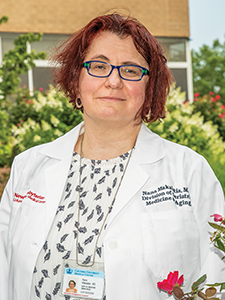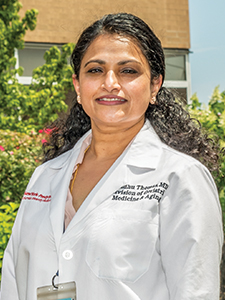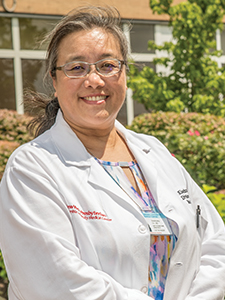Focus on Faculty: Geriatrics
In the Division of Geriatric Medicine and Aging at NewYork-Presbyterian/Columbia, Nana A. Makalatia, MD, Bindhu Thomas, MD, and Xiaoshuang Nancy Yin, MD, are caring for the older adult population at NewYork-Presbyterian Allen Hospital, which serves northern Manhattan, Riverdale, and communities in the Bronx and Westchester. In addition, they are providing geriatric teaching and educational experiences for medical trainees and serving the geriatrics needs of the Hospital and medical school.
Nana A. Makalatia, MD

Dr. Nana A. Makalatia
Born in the Republic of Georgia, Dr. Nana A. Makalatia came to the United States 19 years ago after earning her medical degree at Tbilisi State Medical University. Completing residency training in internal medicine at Lutheran Medical Center in Brooklyn, she then joined Berkshire Medical Center in Pittsfield, Massachusetts, as a hospitalist, an experience that prompted her to specialize in geriatric medicine. “It was surprising how many geriatric patients I had at that time, and I thought this age group was something I needed to know more about,” she says. Dr. Makalatia then went on to pursue a fellowship in geriatrics at NYU Langone Medical Center. “That training opened up my eyes to the many issues and challenges that confront older individuals. It gave me a sense of what to look for, how to assess these patients, and in particular, I learned that I needed to listen better.”
Returning to Massachusetts, Dr. Makalatia practiced primarily in rural communities and compares that experience to now caring for patients at NewYork-Presbyterian Allen Hospital as different “as night and day.”
“The services for and the understanding of this population lag behind in rural areas,” she says. “Here, we have a much greater ability to help people with home health aides, therapy, and community resources. In addition, the advanced communications systems shared by our facilities and practices make it extremely efficient in accessing our patients’ records quickly to understand their medical history.”
Dr. Makalatia believes there needs to be greater understanding of the aging process and why some individuals live to advanced years independent and functional and others decline rapidly. “We need to recognize the physiology of many of the issues that are so prominent in the geriatric population,” she says.
Clear communication between physicians and patients on difficult subjects is also critical, adds Dr. Makalatia. “For example, physicians need to be able to discuss advance directives with their patients to understand what their wishes are and how they want to live out their lives. I find that patients are very receptive to those discussions — it is all in how you approach it.”
Bindhu Thomas, MD

Dr. Bindhu Thomas
After earning her medical degree at Fatima College of Medicine, Philippines, Dr. Bindhu Thomas completed a family medicine residency as well as a geriatric medicine fellowship at the University of Medicine and Dentistry of New Jersey, Robert Wood Johnson Hospital. Dr. Thomas is also certified in Hospice and Palliative Medicine. “As a family medicine trained physician, my practice ranged from delivering babies to seeing geriatric patients,” says Dr. Thomas. “During residency I had more satisfaction caring for older adults, which pushed me towards pursuing training in geriatrics.”
A geriatrician with NewYork-Presbyterian Allen Hospital for the past 10 years, Dr. Thomas appreciates the additional time allotted to seeing new patients. “Most physicians know that evaluating and caring for a geriatric patient presents certain challenges, but unless one actually practices in the field, it is difficult to truly understand,” she says. “It takes time for our patients to get into the examining room and settle down and then to examine them and get to the bottom of the problem. It generally takes three times longer to answer one question of an older patient compared with younger patients.”
Medication reconciliation is a particularly important issue to address, says Dr. Thomas. “Our older patients are usually seeing other specialty physicians who often prescribe medicines on top of what we have prescribed,” she says. “When the patients return to us for care they frequently are on new medicines and we try to figure out when the medication we had prescribed was stopped and why. A large portion of our visit is used to explain why they are taking each medicine and what to anticipate. We are also educating their family and many times their home attendants. In those cases, we then call the family to update them.”
Dr. Thomas values being part of a team of geriatricians. “There is no other way in geriatrics to work but as a team,” she says, noting that nurse practitioners, medical assistants, and office personnel are also key members in their practice. “We are proud to be part of Columbia doctors providing geriatric care to our patients,” adds Dr. Thomas. “As we grow and face the challenges of this patient population, we hope to continue to do so in a kind and complete manner.”
Xiaoshuang Nancy Yin, MD

Dr. Xiaoshuang Nancy Yin
Dr. Nancy Yin earned her MD at Beijing Medical University, where she practiced for several years. In 1990, she came to NewYork-Presbyterian/Columbia to complete a research fellowship, followed by a residency in internal medicine at St. Luke’s-Roosevelt Hospital Center. She then went on to pursue a fellowship in geriatrics at NewYork-Presbyterian/Weill Cornell Medical Center.
“During my residency in internal medicine I could see how hard it was for the elderly and their families to navigate health care and to be able to put together a care plan,” says Dr. Yin. “I thought that it would be great for me to have the extra training and knowledge to apply with any elderly patient with specialty needs. I wanted to become a geriatrician so I could provide much better care for elderly patients.”
For the past eight years, Dr. Yin, who is also board certified in Hospice and Palliative Medicine, has been addressing the multiple health challenges the elderly face. “In addition to medical issues, many people have cognitive impairment and do not have enough social or family support,” she says. “That is a huge difference in this age group compared to a regular general medicine practice. When the patient asks a question, you have the answers ready, but if they are also hard of hearing it takes a longer time to explain.”
Medication compliance is another hurdle for many older patients. “In general medicine, an adult patient might take two, four, or even five medications and they know the dosage,” says Dr. Yin. “Our elderly patients may be on as many as 10 medications and that poses a big problem. It’s easy to prescribe the medication, but it’s very hard to make sure the patient is filling the prescription and then taking it according to your instructions. So, much of our time is spent trying to make sure they are filling the prescriptions regularly and taking them correctly. In addition, often people see multiple doctors and end up having medications that interact with each other. Or they might take the same medication with a different brand name and double the dose. These are the issues we have to deal with every day.”
Coming to NewYork-Presbyterian/Columbia, says Dr. Yin, has allowed her to “practice the best medicine I can. Here at the geriatric practice we do what’s best for our patients, including calling the patient and family after work to try to save them a trip to the Hospital. Imagine how difficult it is for someone who is 95 years old to make an office visit, so we do what we can to make it easier for them.”
For More Information or to Make a Referral
Geriatric Medicine and Aging
NewYork-Presbyterian Allen Hospital
5141 Broadway at 220th Street
New York, NY 10034
Patients
212-932-6036
Administration
212-932-4080



